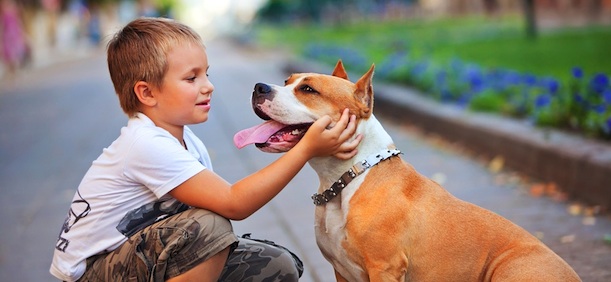
Including humane education as part of regular school curriculum will help all children learn appropriate behavior, not just those fortunate enough to come from stable, loving homes. That said, it is critical for high-risk children such as those who have been abused.
When children learn to treat animals well, they are more apt to treat people well. If children are allowed to express their frustration and aggression by abusing animals, they will learn to express it on other people as well, perpetuating the cycle of violence and opening the doors to a future life of child abuse, domestic abuse and other interpersonal violence.
"According to research, one of the causes of aggression toward both animals and people is inability on the part of the aggressor to read the signals being given off by the other party. He or she (usually he) reacts violently because he misinterprets the intentions of the other person or animal. Understanding animal behavior and nonverbal communication are topics for humane education. Another cause of violence is lack of empathy. Without the ability to mentally put himself in anothers shoes, a person sees others as objects instead of feeling beings and abuse becomes easy. Thus the development of empathy for others, human and nonhuman, must be an integral part of humane education." (Source: Violence Link Research and Humane Education by Elizabeth Gredley)
When dealing with intervention programs for at-risk or high-risk children, it is important first to understand the basics of why animals are often used in counseling programs, and the specific benefits they provide to the healing process.
Counselors often begin with animals in cases of profoundly abused children because animals offer unconditional love (something that has often been lacking in the lives of these children), and because most children are naturally drawn to animals.
One of the consequences of neglect and abuse is the loss of a child's ability to trust. Through the process of learning to care for animals, children learn to trust the animal not to hurt them, and eventually begin to trust the counselors not to hurt them. Through positive interaction with animals and counselors, children coming from environments of physical or sexual abuse learn about "safe touching", and can begin to overcome their fears of physical contact that have resulted from years of abuse. From there they can begin to apply these trust concepts to others, and progressively learn how to form healthy relationships.
When humane education is properly applied, the benefits extend far beyond promoting loving relationships with animals and empathy in children. One example that quickly comes to mind is a humane education program which uses horses to help at-risk children. In this program, they must first learn to take care of the horses, and only then are they permitted to ride them.
This paradigm is used in many humane education programs, and is effective on multiple levels. Children learn how to care for the animals, and begin to form trusting relationships, as we have already discussed - but a good humane education program also helps develop empathy, trust, respect, sensitivity, personal responsibility, community responsibility, self-control, self-worth and self-esteem. They also begin to understand the concepts of a positive feedback cycle: when the child treats the animal well, the animal gives them more attention. This is especially relevant in situations where a child is accustomed to behaving badly and acting out as a way to get the attention they are being routinely denied.
We mentioned personal responsibility and community responsibility. In the paradigm mentioned above, the child begins to understand that they are accountable for their actions (or lack of action) and that there are consequences if they do not fulfill their responsibility - encouraging personal responsibility. Additionally, because the children stay over on the horse ranch and are involved with daily chores, they are taught community responsibility. They perform a contributing and positive role in the community, and are able to enjoy the rewards of being a productive member of that small society.
Fortunately, there are many wonderful humane education programs out there, and we encourage you to check out some of the programs listed in the First Strike interventions program directory.